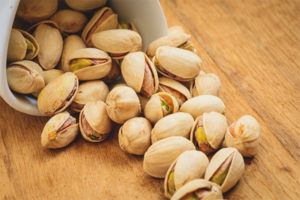The content of the article
Often, future mothers have gustatory tastes - either you want chocolates, or strange fruit, or fried meat. Thus, the body signals a lack of any vitamin or trace element, urging the woman to fill the deficit as soon as possible.
Pregnant women are very fond of pomegranate, and they are often drawn precisely to this fruit because of the high content of iron and B vitamins. But before using any product, it is necessary to know what kind of benefits and harm it carries, how to choose correctly and at what time you can afford.
What do pomegranate grains contain?
Absolutely everything is useful in this valuable tropical fruit - and the peel, which can be added to teas or decoctions, and juicy pulp containing tannins and, most importantly, bones. Doctors do not recommend abusing pomegranate seeds, as they can clog the intestines and cause prolonged constipation, which therefore often accompany a woman "in position."However, in reasonable doses, even pomegranate seeds are very useful due to the chemical composition:
- proteins - 1% of the daily requirement (100 g of the product);
- lipids - 1%;
- complex carbohydrates - up to 7%;
- fiber and dietary fiber - up to 5% of normal;
- B vitamins (B6, B5, B9), E, ascorbic acid;
- ethers;
- macro- and microelements (magnesium, zinc, iron, potassium, and others);
- tanning components;
- antioxidants;
- organic acids;
- flavonoids, etc.
The calorie content of sweet pomegranate is moderate - about 70 kcal per 100 g. At the same time, 20% of the fruit is well digestible sugars.
Vitamins and trace elements in the composition of pomegranate are involved in the process of blood formation, the production of red (red blood cells) and white (white blood cells) blood cells. They also contribute to the development of the embryonic neural tube, the laying of its cardiovascular system. The use of pomegranate seeds several times a week reduces the likelihood of fetal malformations in the first trimester.
Magnesium and iron in the composition of berries are necessary for the formation of all systems of the child. Gynecologists and nutritionists recommend pregnant women to use grains and fresh ones to prevent iron deficiency anemia (anemia).
The benefits of pomegranate for the future mother
Due to the significant content of ascorbic acid, pomegranate helps to strengthen the immune system and the body's resistance to environmental factors. The fruit must be eaten during the "winter" pregnancy, as it produces prevention of seasonal avitaminosis and fills the body's need for dietary fiber and energy components.
Antioxidants in the composition of grains bind and neutralize radionuclides, kill pathogenic microflora, protecting mother and child from possible diseases.
White partitions between the berries are not recommended for pregnant women, however, one can prepare a useful decoction for gargling. Knitting and tanning components relieve inflammation and swelling of mucous membranes, facilitate sputum discharge without the need for the use of synthetic drugs.
Pomegranate seeds are most useful for pregnant women and babies:
- Vitamin B5 (pantothenic acid) is involved in redox reactions, normalizes balance, preventing the development of acidosis. Also this vitamin promotes the secretion of hepatic hormones.
- B6 (pyridoxine) stimulates the production of pleasure hormones, is responsible for the digestibility of iron and the transfer of genetic information. Lack of vitamin affects regenerating processes, as a result of which allergic reactions, dermatitis and other pathologies can occur.
- Potassium (the daily rate in pomegranate is up to 6%) is responsible for maintaining the body's water-salt balance. It strengthens the heart muscles of the mother and child, safely regulates internal pressure, normalizes the kidneys. Also, potassium is involved in the transmission of nerve impulses, thereby reducing the effects of neurosis during hormonal jumps in a pregnant woman.
- Iron normally 5.6% maintains hemoglobin levels, which carry oxygen and provide cellular respiration. It is through iron that the baby receives oxygen through the mother’s body. Also, this trace element strengthens the immune system, is responsible for the work of the central nervous system and regulates the modes of wakefulness and sleep.
Also substances in pomegranate stimulate intestinal peristalsis, improve digestion, and prevent parasitic invasion.
As for the timing, the pomegranate is useful in all trimesters.
The first 3 months it reduces the symptoms of toxemia, makes it easier to tolerate morning sickness, normalizes stool. Also, due to potassium and magnesium, the nervous system calms down, anxiety, moodiness and tearfulness decrease.
On the 2nd and 3rd trimester, pomegranate berries help to remove excess fluid from the body (a slight diuretic effect), clean the kidneys and reduce puffiness.
How to choose a grenade
The future mother should be especially careful in choosing the fetus so that it brings only benefit to the body.
Sometimes ripe fruit is hard to distinguish from green or rotted, but there are several significant signs.
- Peel color. In a ripe pomegranate, it is glossy bright red or burgundy. Dim or yellowish peel - a sign of an unusable fetus. Also, the skin should be thin and even with no traces of cracks, dents and brown spots.
- States tail. Normally, in a mature pomegranate, the tail is dry and elastic, if you pull it up - do not tear it off.
- Weight of the fetus. Pouring ripe grains become heavy.
When choosing juice it is necessary to estimate the cost of the product, the brand of the manufacturer and composition.Remember that natural squeezed juice will cost a lot of money. And budget brands can offer a drink from a mixture of pomegranate juice with elderberry or black currant. Such a product will be devoid of cloying astringency, and the finish will be a little watery. Unfortunately, this juice will not bring enough benefit to a pregnant woman, and may also contain undesirable dyes, sweeteners and flavor enhancers.
Contraindications and harm
Women "in position" need to carefully study the properties of certain products before use. What was useful before can harm the baby and even cause individual intolerance already in the womb.
Nuances of using pomegranate during pregnancy are as follows:
- Future mothers often suffer from constipation, and some develop hemorrhoids. In this case, it is strictly forbidden to use the grains together with the bones, otherwise the stool becomes very hard and brings strong discomfort during the act of defecation. But this is not dangerous - in order to empty the stomach a woman will have to strain herself a lot, and this is fraught with the first (the threat of miscarriage) and the last (preterm labor) trimesters.
- Some people use in the diet not only berries, but also white membranes - partitions.In pregnant women, they are strictly banned - the components can increase the tone of the uterus. Partitions also contain natural antibacterial enzymes that can harm an immature baby.
- In future mothers, the acidity of the stomach can dramatically increase, and heartburn can occur. Under these conditions, it is forbidden to consume any berries and sweet-sour fruits, such as pomegranate, as they can provoke the development of gastritis, enterocolitis and even ulcers.
- It is known that women in “position” often spoil their teeth due to a lack of calcium, and the enamel becomes sensitive to chemical irritants. The use of sugary and concentrated fresh pomegranate can exacerbate problems and lead to acute pain, the proliferation of bacteria in microcracks. Doctors recommend diluting the juice with others (for example, with beet or carrot), as well as drinking it through a straw.
- Weakening of immunity for carrying a baby leads to an exacerbation of allergic reactions. And pomegranate, by the way, is quite a strong allergen, as it contains extractive components, ascorbic acid and esters.If itching, redness or swelling of the mucous membranes, as well as general malaise after a pomegranate snack, you should consult a doctor and exclude various fruits and berries from the diet.
- As the fetus grows, the pressure of the uterus on the internal organs increases. As a result, violations of the kidneys, problems with urination are often observed. Pomegranate has a diuretic effect, which can greatly impair weakened kidneys and lead to aching back pain.
In the absence of contraindications, doctors are allowed to use a glass of non-concentrated pomegranate juice in the morning (grains of 1 fruit).
If the expectant mother has a clear desire to eat pomegranate - then the body asks to fill in the missing components (for example, vitamins, iron, amino acids or antioxidants). But remember that the use of fruit does not replace the examination and treatment by a doctor who will write out complex vitamin preparations to maintain the health of the future mother and child.
Video: the benefits and harm of pomegranate











To send